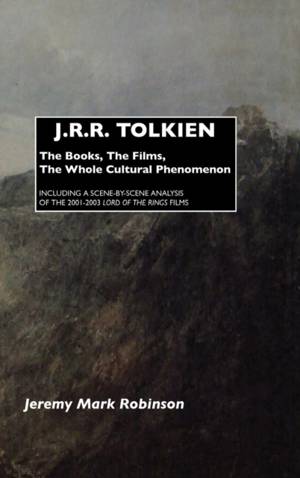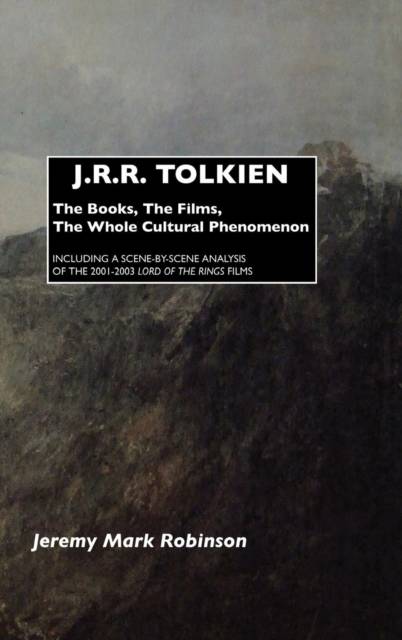
- Retrait gratuit dans votre magasin Club
- 7.000.000 titres dans notre catalogue
- Payer en toute sécurité
- Toujours un magasin près de chez vous
- Retrait gratuit dans votre magasin Club
- 7.000.0000 titres dans notre catalogue
- Payer en toute sécurité
- Toujours un magasin près de chez vous
J.R.R. Tolkien
The Books, the Films, the Whole Cultural Phenomenon: Including a Scene-By-Scene Analysis of the 2001-2003 Lord of the
Jeremy Mark RobinsonDescription
A book exploring the world of J.R.R. Tolkien, Britain's premier fantasy author, in over 800 pages. New, updated edition.
Part one of this book focusses on J.R.R. Tolkien's texts, principally those dealing with his 'secondary world' of Middle-earth. Part two explores the 2001-03 Hollywood movies of The Lord of the Rings, with a scene-by-scene analysis of the three films. Part of this book explores the influence of the Tolkien industry, in areas like computer gaming, pop music, merchandizing and cinema.
EXTRACT FROM THE INTRODUCTION
Philip Toynbee declared, in 1961, that Tolkien's 'childish books had passed into a merciful oblivion', a wonderful statement, just a tad inaccurate. In 1997, The Lord of the Rings was voted the top book of the 20th century by readers in a British bookstore's poll (Waterstone's). 104 out of 105 stores and 25,000 readers put The Lord of the Rings at the top (1984 was second).
Around 100 million copies of The Lord of the Rings had been sold by the end of the twentieth century, and 60 million copies of The Hobbit, with sales of around 3 million per year of the two books combined. Readers just love reading Tolkien's books. It's that simple. You can't force people to buy books or go see movies; there's isn't a magic formula (or ruling ring) to hypnotize readers and consumers (if there was, it'd be worth billions). And the Tolkien phenomenon began with readers. Back in 1937, 1954 and 1955, the publishers Allen & Unwin did their bit, of course, with reviews, blurbs, advertizing and so on, promoting The Hobbit and The Lord of the Rings, and the critics too, but it was readers who first started the phenomenon that has become truly global. Tolkien's influence on literature has been considerable, too, and not just in the realm of fantasy, sci-fi, fairy tales and related genres. As fantasy author Terry Brooks said, Tolkien 'was the premier fantasy writer of the last century, and all of us writing today owe him a huge debt.' No other writer W.H. Auden reckoned had 'created an imaginary world and a history in such detail'. Colin Wilson agreed that only a few writers have concocted a total universe, and that Tolkien's was very impressive. Tolkien's mythological writings may be the 'largest body of invented mythology in the history of literature', according to David Day. Invented, that is, by one person. It's also 'certainly the most complex and detailed invented world in all literature'.
JEREMY MARK ROBINSON
Jeremy Robinson has written many critical studies, including Steven Spielberg, Arthur Rimbaud, Jean-Luc Godard, and The Sacred Cinema of Andrei Tarkovsky, plus literary monographs on: J.R.R. Tolkien; Samuel Beckett; Thomas Hardy; André Gide; Robert Graves; and Lawrence Durrell.
Spécifications
Parties prenantes
- Auteur(s) :
- Editeur:
Contenu
- Nombre de pages :
- 820
- Langue:
- Anglais
Caractéristiques
- EAN:
- 9781861713209
- Date de parution :
- 01-03-11
- Format:
- Livre relié
- Format numérique:
- Genaaid
- Dimensions :
- 156 mm x 234 mm
- Poids :
- 1310 g

Les avis
Nous publions uniquement les avis qui respectent les conditions requises. Consultez nos conditions pour les avis.






